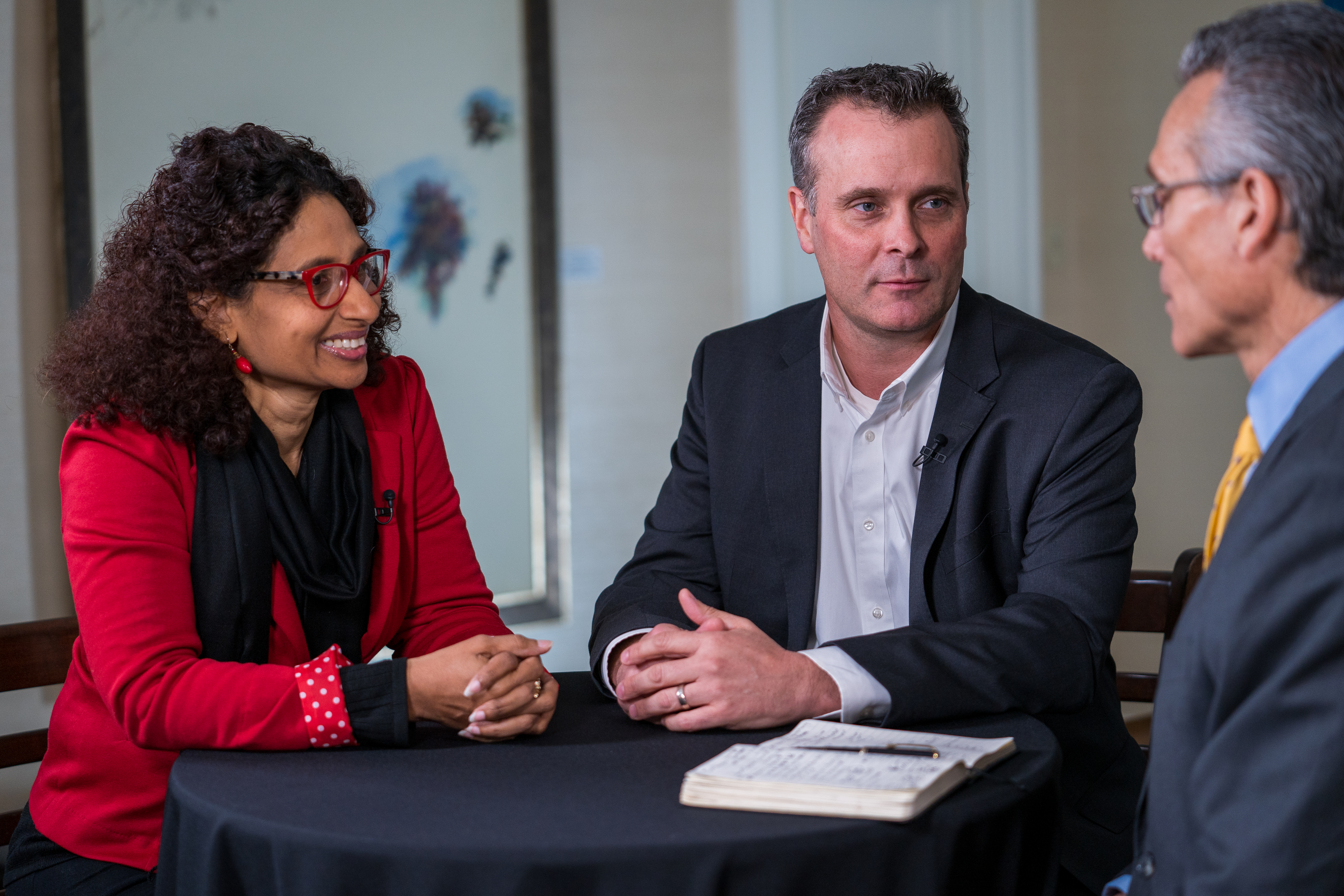 AI
AI
 AI
AI
 AI
AI
As artificial intelligence and machine learning step into the forefront of the digital revolution, Oracle Consulting is holding out a hand to help companies make the leap from traditional operations to autonomous workload management.
“There’s no denying that we’ve entered the age of AI; that everyone knows that artificial intelligence and machine learning are a key to their success in the business marketplace going forward,” said Grant Gibson (pictured, center), group vice president of growth and strategy at Oracle Consulting. “Making that leap to be an autonomous enterprise is challenging for companies to wrap their heads around.”
As part of the rebirth of Oracle Consulting, the company is offering holistic assistance to make the leap: “We’ve developed a practice around how to manage the technology needs for that transformation as well as the human needs, as well as the data science needs,” Grant stated.
Grant and Janet George (pictured, left) group vice president of autonomous advanced analytics with machine learning and artificial intelligence at Oracle Consulting, spoke with Dave Vellante (pictured, right), host of theCUBE, SiliconANGLE Media’s mobile livestreaming studio, as part of Oracle Consulting’s “Empowering the Autonomous Enterprise of the Future” initiative. They discussed the benefits and problems surrounding leveraging AI in the enterprise. (* Disclosure below.)
Before the age of artificial intelligence came the age of big data. Hadoop was instrumental in this, creating the concept of platform and freeing data from being stuck in tools. This opened the door for the growth of data lakes and on to intelligent technologies, such as AI.
“We need the concept of platform so we can be elastic for the growth of the data,” George said. “It can be distributed. It can grow based on the growth of the data. And it can learn from that data. So that’s the reason why Hadoop sort of brought us into the platform world.”
Companies swimming in data resources were eager to use AI to capitalize on their “new oil” resources, but they made a mistake of using poor quality, biased data, according to George. “We just thrust the data to AI. And that’s why we saw the initial wave of AI sort of failing, because it was not ready for AI,” she said.
Data scientists have “heavy responsibility” to ensure data is balanced and that AI is ethical, according to George.
“Are you training a machine learning model with the bias? Is there diversity in the models? Is there diversity in the data? These are conversations we need to have,” she said.
But while data scientists have to be accountable, policy is also essential.
“If we look at the source of the data and the source of the data is inherently biased or the source of the data has only a single representation, we’re never going to change that downstream,” she said. “That has to change upstream. That’s where the policy makers come into play, the lawmakers come into play.”
Humans are inherently biased, but this can be eliminated through iteration, according to George. Oracle’s Cloud Data Science Platform is transparent in that it reveals how the AI model picked features and allows the data scientist to rearrange them.
“Ultimately, to the data scientists’ dismay, somebody on the business side is going to ask about causality: ‘This is what the model says — why is it saying that?’” Gibson said. “And, ethical reasons aside, you’re going to want to understand why the predictions are what they are.”
“We can’t trust AI. Even data scientists can’t trust AI, to a large extent,” George stated. “So, for us to get to that level where we can really trust what AI’s picking in terms of a model, we need to have explainability.”
Successfully incorporating AI into the workflow is a business problem, according to George. “When AI is a technology problem, the company is at a loss,” she said. “AI has to inform the business strategy.”
This means a complete change of business model for many traditional companies, which have to reorganize to place data at the core of their operations. “You can’t afford to have your data sit in silos,” George stated. “When you start to break down the silos, you start to recognize what data you don’t have to take your business to the next level. That awareness will not happen when you’re working with existing data.”
This means getting the infrastructure right: “I always say you can’t have the best toilet if your plumbing doesn’t work. You have to bring in modern infrastructure, distributed computing. There’s no compromise there,” George conclude.
Watch the complete video interview below, and be sure to check out more of SiliconANGLE’s and theCUBE’s coverage of the “Empowering the Autonomous Enterprise of the Future” initiative. (* Disclosure: TheCUBE is a paid media partner for the Oracle Consulting Empowering the Autonomous Enterprise program. Neither Oracle Consulting, the sponsor for theCUBE’s coverage, nor other sponsors have editorial control over content on theCUBE or SiliconANGLE.)
THANK YOU